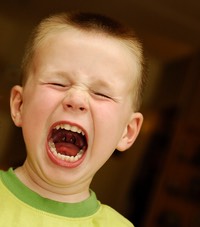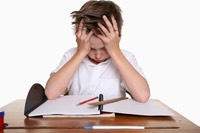
All children get angry. In fact, all children should get angry. It's healthy to feel your feelings. But it's not healthy to be overwhelmed by your feelings. And it's not healthy to overwhelm those we care about or who care about us. In psychology, we call anger a secondary emotion. It is actually a response to a primary emotion, which means that some other emotion came first and that anger is a reaction to it.
Emotions that come first are emotional hurt, fear, and frustration. To help your child deal with anger, you have to get underneath the display of anger and into the source, which his easier said than done!
When your child is on the way to melting down (not mid-meltdown), try to focus his or her attention on hurt feelings (jealousy, aloneness, inability, guilt, confusion, etc.) or on feelings of frustration--wanting something and not being able to get it. "Don't you hate it when you can't have what you want? I know I feel like that sometimes." Or "I know you're feeling left out and like no one likes you right now. That must feel just awful!" When you articulate the feelings instead of the behavior, you are modeling caring behavior, proving that you understand, and giving your kids the language they need to say it themselves. Sometimes just knowing that there is a word for a feeling helps to tame it. Helping kids to identify, explore and express their emotional states will go a long way toward easing angry outbursts. Typically, children are just as unhappy with their angry outbursts as you are--feeling out-of-control is no picnic, and your child will be thankful for the guidance.
Remember, children are still building their emotional skills and need practice. Younger children will benefit from helping their toys be emotional. Kids who pretend to be the parent or older sibling to a stuffed animal or doll are practicing the words you gave them. So, make sure you've given them some good ones. As children play out these dramas, they are internalizing their own abilities to manage emotions. Encourage this kind of play--even if it starts with an out-of-control teddy bear who is destroying the playroom.
Another reason for children's anger is that it works. Children learn very quickly how to control their environment, and if screaming and tantruming garners power and control, children will use it. It's not malicious, just effective. Behavioral patterns involving the use of anger to control the environment begin early in life when these are the only tools available. Some kids are naturally adept at power and control. Others learn by doing. Either way, consistent and firm assertion of your own guidance will help: "Mean what you say, and don't sway." Your child will fairly quickly try a new tactic for gaining power when the old one doesn't work any more. Show your child how to share power instead of demand it. "Sweetheart, I need your help. I want to decide what we should have for lunch, do have any suggestions that we might all like?" Cooperation and connection always feels better than distance and alienation.
